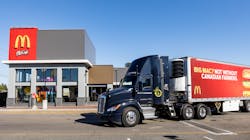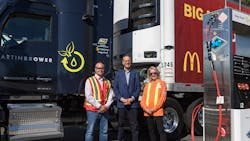McDonald’s tests RNG trucks in Canada
McDonald’s is testing a new Kenworth truck fueled by renewable natural gas (RNG) through its distribution partner Martin Brower of Canada.
The tractor is McDonald’s Canada’s first to run on 100% RNG provided by FortisBC Energy. It’s in operation now in British Columbia, and six additional RNG trucks are slated to arrive later this year, the companies said.
“At McDonald’s Canada, we know making small changes to our supply chain can result in a big impact, which is why we’re working with our long-time distribution partner Martin Brower to help us use our scale for good,” said Rob Dick, supply chain officer at McDonald’s Canada. “Globally, we’ve pledged to achieve net-zero greenhouse gas emissions by 2050—a pledge that we are continuing to make progress toward here in Canada by investing in real and tangible changes like testing seven new Kenworth tractors powered by RNG provided by FortisBC.”
Testing will assess the feasibility of using the RNG power units to supply McDonald’s restaurants throughout Canada as a way to reduce the company’s greenhouse gas (GHG) emissions, McDonald’s said. The refrigerated trailers in the operation will continue to use diesel-powered transport refrigeration units (TRUs).
“We are committed to providing customers, like McDonald’s Canada, with a lower-carbon fuel option to reduce greenhouse gas emissions in commercial transportation,” said Mike Leclair, vice president for major projects and liquefied natural gas at FortisBC. “Renewable Natural Gas has enormous potential to economically reduce greenhouse gas emissions from transportation, a sector that contributes over 40% of greenhouse gas emissions in the province.”
RNG helps reduce GHG emissions by putting organic waste to work. FortisBC takes advantage of carbon already in the system by capturing methane and repurposing it, the company said. RNG can reduce GHG emissions by displacing conventional natural gas in supplying energy to homes, businesses, and transportation.
FortisBC will supply Martin Brower with up to 5,000 gigajoules of RNG over the next year.
Alongside the Kenworths, McDonald’s Canada also is trialing the new Volvo VNR Electric Class 8 tractor through Martin Brower for distribution to restaurants in the Montreal area.
“Our goal is to deliver innovative and meaningful solutions that help restaurants and our business create a more globally sustainable, ethical, and responsible future,” said Julie Dell’Aniello, president of Martin Brower Canada. “Integrating the first renewable natural gas tractor into our fleet is an essential step toward further minimizing Martin Brower’s carbon emissions and environmental impact.”

